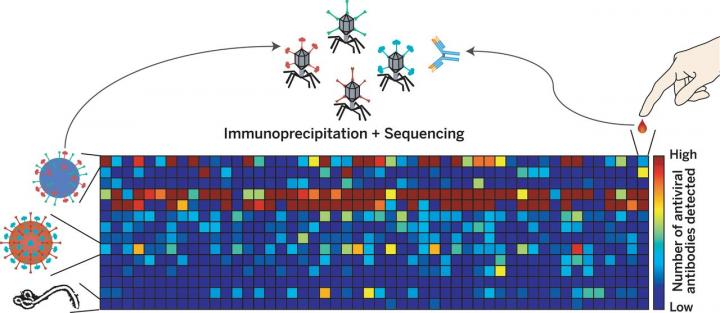
Credit: G. Xu et al./Science 2015
Measles is more harmful than scientists once suspected.
An analysis of blood from 77 unvaccinated children before and after a measles outbreak swept through their Netherlands community revealed that the virus erases the body’s memory of previous pathogens. Measles eliminated between 11 and 73 percent of the children’s protective antibodies – the blood proteins that “remember” past encounters with viruses and help the body avoid repeat infections. Researchers report the news October 31, 2019, in the journal Science.
Without these antibodies, children lose much of their immune defenses and become vulnerable to viruses they’ve already met and conquered. These kids aren’t as defenseless as newborn babies, says study coauthor and Howard Hughes Medical Institute Investigator Stephen Elledge, but some of them are close. “We’ve found really strong evidence that the measles virus is actually destroying the immune system,” he says.
The discovery underscores the importance of widespread vaccination. “The virus is much more deleterious than we realized, which means the vaccine is that much more valuable,” says Elledge, a geneticist at Brigham and Women’s Hospital.
The virus that causes measles is one of the most contagious viruses scientists have ever seen. Before the development of a vaccine in 1963, measles caused between three and four million cases in the United States every year. That number plummeted in the following decades – in 2000, when the disease was declared eliminated from the United States, just 86 cases were reported. Since then, measles has resurged, often surging through unvaccinated or under-vaccinated communities. This year, the US Centers for Disease Control has reported 1,250 cases as of October 3.
Previous studies have hinted that the disease’s effects stretch long beyond the infection. Measles might suppress infected people’s immune system for two to three years, making them susceptible to other diseases, one 2015 report from study coauthor Michael Mina suggested. Researchers had hypothesized that measles might cause a kind of “immune amnesia,” where the body forgets the pathogens it had already seen.
Elledge’s group hadn’t been planning to test the idea – they were just fine-tuning their virus-detecting technology. VirScan, a tool Elledge and his colleagues reported in 2015, identifies all the viruses that have infected an individual, using just a single drop of blood. VirScan can detect antibodies to HIV, influenza, herpes, and hundreds of other viruses. “But we had a really hard time detecting measles,” he says.
For people vaccinated decades ago, the amount of measles antibodies in the blood might be too low for VirScan to spot. So Elledge teamed up with Mina, an epidemiologist now at Harvard University, and Rik de Swart, of the Erasmus University Medical Center, to analyze samples from recently infected kids.
In 2013, de Swart’s team in Rotterdam had collected blood from unvaccinated children in an Orthodox Protestant community in the Netherlands, with consent from the kids’ parents. Later, a measles epidemic struck, and researchers returned to collect another set of blood samples. The average time between sample collections was 10 weeks.
Years later, Elledge analyzed the samples using VirScan. His team had no trouble seeing measles antibodies – a sign that the technology worked as intended. But they did notice something peculiar. The kids’ other antibodies seemed to be disappearing.
After measles infection, the collection of antibodies kids had built up over their lifetime shrank – sometimes drastically. Depending on whether the infection was mild or severe, kids lost 33 or 40 percent of their total antibody collection. “We were trying to figure out how VirScan worked with measles,” Elledge says. “And then we made this discovery. When measles hits, antibodies just go away.”
The researchers repeated the experiment in four macaque monkeys – this time collecting blood samples before and up to five months after infection. The results were even more stark. The monkeys lost, on average, 40 to 60 percent of the antibodies that protect them from other pathogens. Elledge thinks his team may have seen similar numbers in the kids, had the team tested them again later. It takes time for antibodies to fade from the blood, he says.
Elledge’s team is now trying to develop methods to detect viruses currently circulating in people’s bloodstream. He’s also working with a company to license VirScan for academic use.
But for Elledge, the practical implication of the current work is clear. “Vaccinate your kids,” he says. Children who skip the measles vaccine, known as MMR, and become infected with measles may actually need to be revaccinated for previous diseases, he says.
###
Citation
Michael J. Mina et al. “Measles virus infection diminishes preexisting antibodies that offer protection from other pathogens.” Science. Published online October 31, 2019. doi: 10.1126/science.aay6485
Media Contact
Meghan Rosen
[email protected]
Related Journal Article
http://dx.




